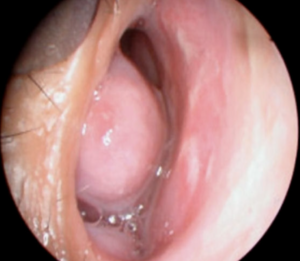This article summarises our work over the last year to improve the timely management of adults and children who suffer from allergic rhinitis (AR). The main message we wish to impart is correct technique, using a combination of oral antihistamines, nasal saline rinses and intranasal corticosteroid spray (INCS) as per the SPC. We find community care do not advise to use the sprays for long enough, especially if some improvement is noted. It is important to not just trial nasal sprays for two weeks and refer to GPs, but to continue the medications for a longer period of time. In our experience nasals sprays take longer than two weeks to work. We would advise online resources to augment the pharmacy consultation. In 2015, the American Academy of Otolaryngology-Head and Neck Surgery Foundation published a clinical practice guideline on AR. This article aims to combine the experience of allergists, otolaryngologists, pharmacists, with internationally published guidelines.

Definition:
- Allergic rhinitis (AR) is an inflammatory, IgE-mediated disease characterised by nasal congestion, rhinorrhoea, sneezing and/or nasal itching and conjunctivitis;
- It can be seasonal (dependent on geographical location and climate conditions) or perennial (secondary environmental aeroallergens);
- It can be intermittent (< four days/week or < four weeks/year) or persistent (> four days/weeks or > four weeks/year); and
- AR severity can be classified as mild or severe (when symptoms interfere with quality of life, for example sleep disturbance, leisure activity limitation, work/school interruption.)
How common is AR?
According to the International Study for Asthma and Allergies in Childhood Phase III, the prevalence of AR amongst children aged 13-14 years was 14.6%. In the UK, 26% of the population has AR. In 2007, 27.2% of Irish children had AR.
What other forms of rhinitis are there?
- Viral-induced rhinitis is the most common cause of rhinitis, more common than allergic rhinitis. It is easily diagnosed;
- Vasomotor rhinitis is often activated by temperature and humidity changes, especially cold dry air, exercise, and airborne irritants;
- Gustatory rhinitis occurs after ingestion of food most frequently spicy or hot foods. It is thought to be a neurological reflex;
- Alcohol-induced rhinitis is secondary to the vasodilator effects of alcohol;
- Hormonal changes during pregnancy, menopause, puberty, and the menstrual cycle can lead to nasal congestion; and
- Several medications can lead to nasal symptoms including antihypertensives such as enalapril (ACE inhibitor) and antidepressants such as citalopram.
Patient assessment
- Focus on the symptoms of AR (nasal congestion, nasal discharge, sneezing, itchy eyes and nose), including triggers, associated co-morbidities (asthma, eczema) and treatment(s) previously used, specifically the duration and technique.
It is important to not just trial nasal sprays for two weeks and refer to GPs, but to continue the medications for a longer period of time.
Patient management
To ensure that AR is effectively treated, it is crucial to use the appropriate technique when administering the steroid spray, and use it for a sufficient duration.
Our tips for success — education is key!
- Identify the patient’s allergen (dust mites, pollen, animal dander) and limit exposure to it. How is a pharmacist able to do this? Some clues about relevant histories, for example, winter for house dust mite (HDM), morning sneezing for HDM, itchy eyes and sneezing in summer for grass;
- Advise non-sedating antihistamines. Antihistamines are particularly good for sneezing and pruritus; and
- Don’t be afraid to dispense steroid sprays for prolonged use, as systemic absorption is minimal for patients with persistent rhinitis;
Nasal spray technique
- The ‘X-factor’ technique uses the left-hand to spray into the right nostril toward the right ear, and for the left nose use the right-hand, pointing to the left ear;
- Gentle sniff. If the ‘patient tastes it, they waste it’ and we want it ‘in the nose, not the toes’;
- Use nasal spray leaning forward at waist with head also bent forwards. This double bend prevents the huge sniff we need to avoid;
- If the patient has ‘a wet nose’ with secretions/mucus, advise them to use saline such as NeilMedâ Sinus Rinse before using the steroid spray and blow their nose after the rinse;
- If patients experience excessive dryness, use the steroid spray on alternate days; and
- Nose bleeds can occur due to poor technique or overuse, stop the steroid spray temporarily/use on alternate days, and use of Nasogel or Sterimar is helpful with dry nasal mucosa.
When to start treatment for patients with allergic rhinitis secondary to grass/tree pollen.
Our advice is to start steroid sprays ahead of the pollen season, i.e. starting on St Brigid’s day (February, first bank holiday) for tree pollen, and St Patrick’s Day or Easter Sunday at the latest for grass pollen. These are all Bank Holidays, and can be easily remembered by Irish patients, however, other nationalities may need other reminders.
Are there online resources for patients to visit and augment the pharmacist’s review?
Yes. We have created QR codes for two websites: one is the HSE Live website on allergic rhinitis; and the second is a video created the Allergy Department in Children’s Health Ireland.
Allergic rhinitis in children
For children under the age of 18 years, an intranasal steroid spray can be prescribed and used in conjunction with Sterimar or other nasal saline spray. Nasacort (triamcinolone) can be used from age two, Nasonex (mometasone) can be used from the age of thee, and Nasobec (beclomethasone) and Avamys (fluticasone) can be used in children from the age of six years.
Over the counter medications INCS (Intranasal Corticosteroid Spray)
Beconase Hayfever Nasal Spray (beclometasone dipropionate)
- Indicated for adults aged 18 years and older;
- 50 micrograms per spray;
- Two intranasal applications into each nostril twice per day;
- If no response after 14 days of treatment, the advice of a healthcare professional should be sought; and
- Do not use continuously for longer than three months without consulting your doctor.
See
hpra.ie/img/uploaded/swedocuments/Licence_PA1186-008-001_15122020122056.pdf.
If you found this article helpful, please complete our quick 30 second questionnaire.
Acknowledgements: Dr Maeve Kelleher (Paediatric Allergy Consultant in CHI at Crumlin); Dr Cristina Warren (General Practitioner with an extended role in Otolaryngology); Dr Nuala Barry (General Practitioner at Monahan Medical Centre); and Dónal Burke (paediatric pharmacist in CHI at Temple Street).


